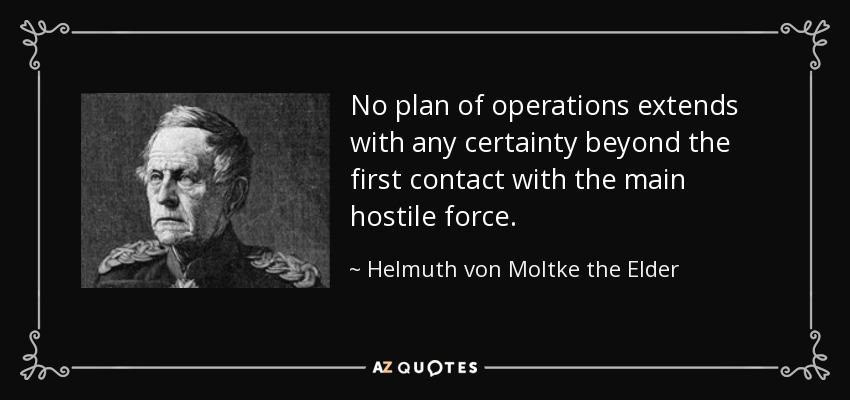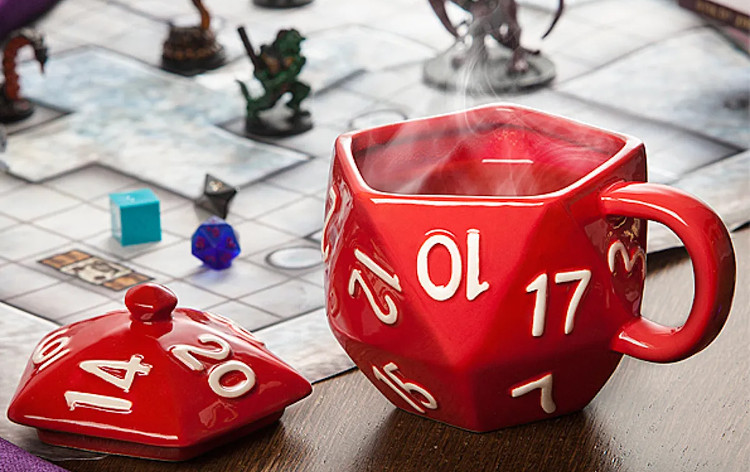Helmuth von Moltke the Elder famously said that “no plan of operations extends with any certainty beyond the first contact with the main hostile force,” or, colloquially, “No battle plan survives contact with the enemy.” It’s popular for Game Masters to say it in lamentation of players who went off the path and didn’t do what they were supposed to do.
The problem for these GMs is that they believe they know the path better than the players, that there are things players are supposed to do. I have no more firm belief as a GM and a player than that the only thing a player is supposed to do is play their character. If they are reacting to the world and the rolls of the dice in the way that makes the most sense to them, they are doing all that they are supposed to do. If, as a GM, your upcoming campaign’s plot has statements like “when the PCs” and not “if the PCs,” you are dangerously close to setting yourself up for a disappointment, or setting your players up for a railroad.
“Plot” is a wonderful word to describe a campaign’s story because its definitions include both of the following meanings:
- The events that transpired (ie the plot of a story)
- The events one hopes will transpire (ie a scheme)
GMs should know to use the first of the above definitions after a campaign concludes. Only then is the plot -by that definition- settled. The second of the above definitions better defines a GM’s story before and during the campaign. It is in progress, and the plot is simply what you, the GM, hope happens.
Here is a reminder of two of the game’s key terms to keep in mind when plotting to avoid the trapping of thinking in terms of the first of the above definitions of plot:
- Player Character: The main characters in the story, and the only characters that you have no control over. These are the player’s characters. You are the only one playing the game who is not categorized as a player.
- Non-Player Characters: The characters you control. Note how they are not Game Master Characters. The game is so about the players that every character in the game is defined by whether it is player controlled or not.
How, then, are you supposed to plot a campaign without insight into what the main characters of the story will attempt to do and if they will succeed? After all, you might think, authors talk about their characters surprising them, but they can force those characters to conform. The mistake there is thinking a GM plots like an author. A GM plots like a villain.
I Would have Gotten Away With it, Too…
Villains have motivations, which lead to goals. They either have the resources to accomplish those goals or know the resources they need to accomplish them and have shorter term goals of acquiring those resources. They also know that there will be resistance, but they don’t know what that resistance will be. They can research to narrow down what they’re likely to face, and plan based on that research and other expectations, but they can’t know all the variables.
Sound familiar?
Say an evil cult leader needs to sacrifice seven souls -one for each virtue- to appease the god of sin, thereby gaining evil power greater than any mortal has ever known. Cool idea, but why? What’s his motivation? Let’s say he wants to show the virtuous that their pompous (his words, not mine) denial of indulgence is pointless, that the sinners are the truly virtuous. Striking them down with the powers of the god of sin is the most literal translation of his motivation.
Now we have a villain with a goal and a motivation. That motivation is important because if the PCs manage to irreversibly prevent his ultimate goal early in the campaign, the campaign stills has a villain. That villain just needs to either change his goal in a way that still satisfies his motivation, or seek revenge on the PCs for ruining his plot. Either way, he’s reacting to the PCs’ actions. It’s like they’re the main characters of the story and their actions matter!
The best example of this type of campaign is the Scooby Doo formula. Rarely does the villain of an episode of Scooby Doo know who the Scooby Gang is. The villain’s connection to the main characters can be minimal or non-existent. What matters is that they have a plan. Usually the villain is a corrupt entrepreneur or industrialist using scare tactics to lower the value of property they want. They assume the people in their way will react fearfully, but one group of people instead faces the fear head-on. The villain adjusts their plans in reaction to this opposition, but one of them is exceptionally insightful, able to see through the ruse and determine the villain’s motivations and therefore identity.
What about when PCs fail? Or fail to act? What if the Scooby Gang fails to sense motive one day and accept that yep, that’s definitely the Ghost of Zen Tuo, they have to leave? This should not derail your campaign either. If you’re plotting like a villain, then you move to the next phase of your plot. Since this plot is grand enough to cover a whole campaign and not just a 22-minute episode, it should reach a point where it crosses the PC’s paths again.
Let’s say you plotted the god of sin campaign above like an author, and thought the PCs would interfere to prevent the first murder, thereby forcing the villain to kill a loved one as the only alternative, adding depth to their villainy, and also introducing the would-be murder victim as a campaign-long NPC. But the PCs failed to spot the cultist stalking that NPC, or are more interested in learning the backstory of a supposedly inconsequential NPC bard they met at the same time. A GM plotting like an author would be upset that their carefully planned plot was ruined by the main characters of the story having agency. Good thing we’re not that kind of GM. By plotting like a villain, we know that the murder took place as we planned despite an opportunity for the PCs to stop it. Now the PCs hear from the NPC they actually care about that the bard’s friend died. The PCs can investigate this murder they just heard about, attend the funeral with their bard friend, or move on. Will the other NPCs the PCs are likely to encounter also be rocked by a local murder? Yes. It isn’t railroading the PCs if big events have impact on the world around them. It’s organic and logical, and shows the PCs that this is important instead of telling them or just expecting them to know.
No battle plan survives contact with the enemy. By plotting your campaign like a villain, every time the PCs impact the certainty of your no plan of operations extends, it is a sign of their importance to the plot, that their actions matter. That’s the whole point of a roleplaying game campaign.









